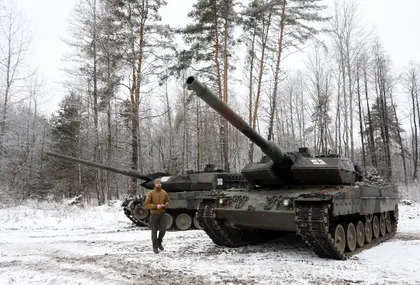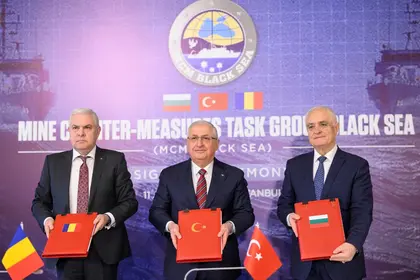NATO members Turkey, Bulgaria and Romania on Thursday joined forces and signed an agreement on demining the Black Sea to ensure safe waters after Russia's war in Ukraine.
The Russian navy mined Ukraine's Black Sea coastline in the early stages of its invasion nearly two years ago.
JOIN US ON TELEGRAM
Follow our coverage of the war on the @Kyivpost_official.
Some of the mines have since washed up in the waters of the three countries, endangering shipping and complicating Ukraine's efforts to break through a Russian naval blockade.
Top defence officials from Turkey, Bulgaria and Romania signed a memorandum of understanding in Istanbul establishing the Mine Countermeasures Naval Group in the Black Sea (MCM Black Sea), which will oversee demining operations.
Romanian Defence Minister Angel Tilvar and Bulgaria's Deputy Defence Minister Atanas Zapryanov joined their Turkish counterpart Yasar Guler at a military residence overlooking the Bosphorus for the signing ceremony.
"It is of vital importance to be protected from security risks that war could cause," Guler said at the ceremony.
"With the start of the war, mines drifting in the Black Sea posed a threat. To overcome this, we have come this far with the joint efforts of our Bulgarian and Romanian allies," he added.
The Romanian defence ministry earlier said the initiative will have a rotating command structure and "contribute to strengthening the allied posture of deterrence and defence of the eastern flank."

Sweden Pledges New $1.2B Military Package for Kyiv
Sinan Ulgen, director of the Istanbul-based Centre for Economics and Foreign Policy Studies, said the mines constituted a serious threat especially with winter storms.
Floating mines ... "are a danger not only for cargo ships but also civilians and civilian ships which do not have the same protection as military vessels," he told AFP.
The agreement should also make it possible to secure Ukrainian grain exports along the Romanian and Bulgarian coasts -- an alternative navigation route put in place after a UN-brokered deal ended following Russian withdrawal in the summer of 2023.
In December, Ukrainian authorities said a Panama-flagged ship arriving to collect grain hit a Russian naval mine in the Black Sea, injuring two sailors.
Guler emphasised that the initiative would involve only the ships of the three Black Sea littoral states, adding that other countries' contributions would be possible when conditions are met.
Neither Russia nor Ukraine provided immediate comment.
Turkey controls Black Sea maritime and naval traffic, which must pass Istanbul's Bosphorus Strait and the Dardanelles before reaching the Aegean and Mediterranean seas.
With the outbreak of war, Turkey invoked a clause of an international treaty called the Montreux Convention banning the passage of naval vessels from non-littoral countries to and from the Black Sea.
The measure prevented Britain from following through on plans last month to send two mine hunting ships in the region to help Ukraine's efforts to export its grain.
The Turkish presidency said early this month that Ankara, which has implemented the convention since 1936, "maintains its unwavering determination and principled stance throughout this war to prevent the escalation of tension in the Black Sea."
"Our pertinent allies have been duly apprised that the mine-hunting ships donated to Ukraine by the United Kingdom will not be allowed to pass through the Turkish Straits to the Black Sea as long as the war continues," it said.
You can also highlight the text and press Ctrl + Enter










